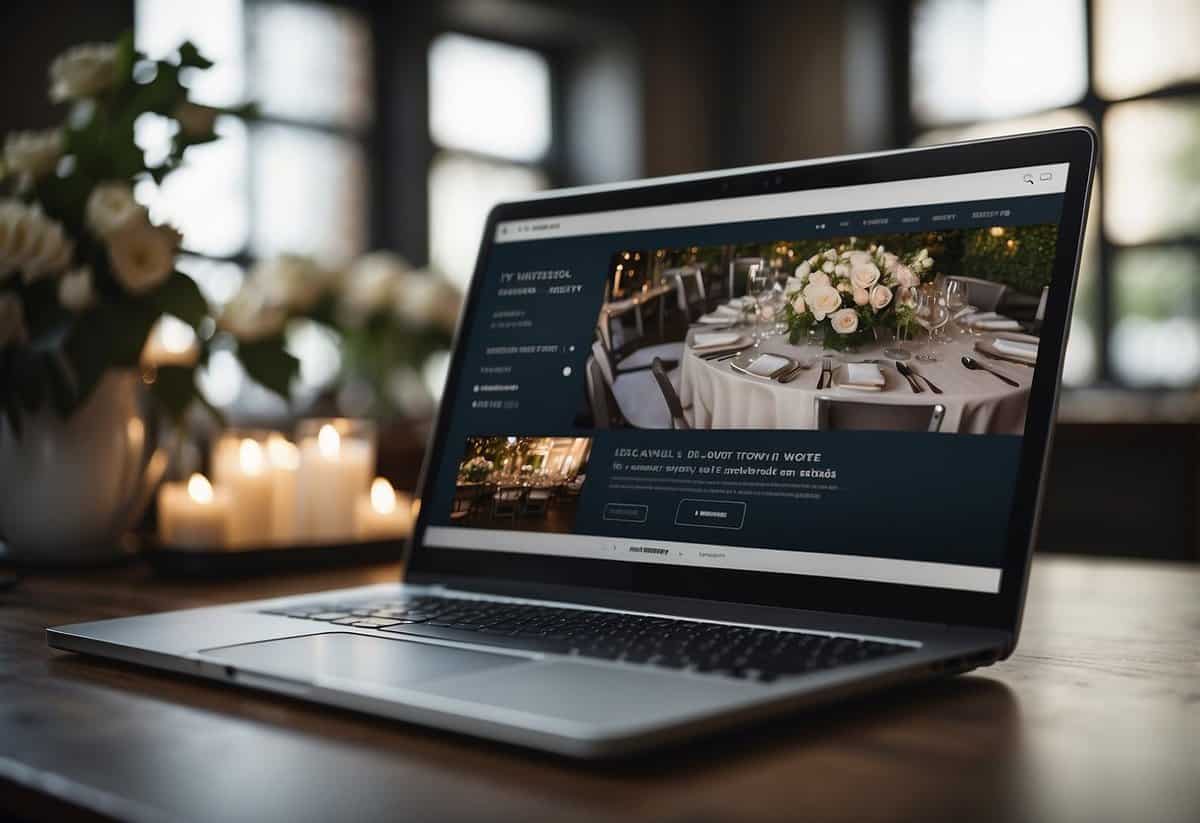How Far in Advance Should You Make a Wedding Website? Tips for Perfect Timing
Planning a wedding involves many tasks, but creating your wedding website is one of the most exciting ones. Your website is a central hub for sharing crucial details with your guests. You should aim to publish your wedding website about six to eight months before your big day. This timing helps ensure your guests have plenty of time to prepare and RSVP.

By having your wedding website ready well in advance, you can include essential information like the date and venue. These elements help guests plan their trip and arrange accommodations early. Don’t forget to add personal touches, like your love story or engagement photos, to make your website stand out.
As you send out your save-the-dates and invitations, you can direct your guests to your website for more details. This not only saves you time answering individual questions but also sets the tone for your wedding. Your website can include everything from the dress code to the RSVP details, making the wedding planning process smoother for everyone involved.
You can start building your wedding website at any time, but make sure it’s ready to share when it matters most. By following this timeline, you’ll ensure your guests are well-informed and excited for your special day.
Determining Your Timeline

Creating your wedding website is an important part of staying organized and ensuring guests have all the information they need. It’s essential to establish your wedding date and plan for pre-wedding events like the engagement party and bridal shower.
Establishing the Date
First, set your wedding date. This is crucial because all your planning revolves around it. Once your date is set, aim to publish your website six to eight months before the big day. This gives guests ample time to plan and make necessary travel arrangements.
Completing your guest list early is also important. Knowing who will attend helps you include all the right details on your website, such as RSVP information and registry links.
Pre-Wedding Events
Include information about your pre-wedding events. If you’re having an engagement party or a bridal shower, make sure these dates and details are on your website. Guests will appreciate having a one-stop resource for all your wedding festivities.
Add dates, locations, and any dress codes for these events. For instance, if your bridal shower is happening three months before the wedding, guests can mark their calendars and make travel plans accordingly. This ensures everyone stays informed and can participate in your celebration smoothly.
Choosing Your Wedding Website Platform

Selecting the right platform for your wedding website is crucial for both ease of use and the features it offers. You’ll want to consider different website builders, their domain name options, and custom URL capabilities.
Comparing Website Builders
When choosing a wedding website builder, look at platforms like Zola, Minted, and Appy Couple.
- Zola is known for its user-friendly interface and integration with its wedding registry. It offers various themes and customization options to tailor your site to your style.
- Minted focuses on beautiful designs and easy-to-use templates. This builder is great if you want your website to match your Minted invitations and stationery.
- Appy Couple provides a mobile-friendly platform with customizable features, great for tech-savvy couples who want a modern touch.
Make sure to explore features like RSVP tracking, guest management, and photo galleries. Some platforms may also offer built-in tools for creating seating charts and sending updates to your guests.
Domain Name and Custom URL
A custom domain name can make your wedding website easier to find and more personal. Instead of a long, complex URL, a custom URL like www.[YourLastName]Wedding.com is simpler and more memorable.
- Zola and Minted offer the option to purchase a custom domain directly through their platforms.
- Appy Couple also supports custom domains and provides guidance on setting them up.
When picking your domain name, ensure it’s easy to spell and remember. Avoid special characters and numbers that might confuse your guests. A clear and straightforward domain name not only looks professional but also makes it simple for guests to locate your website.
What to Include on Your Wedding Website

Creating a wedding website is an important step in planning your big day. Here are some essentials to consider adding to make sure your guests have everything they need.
Essential Elements
First, include wedding details like the date, time, and location of your ceremony and reception. This ensures everyone knows where and when to show up.
Add a section for RSVPs. This lets guests confirm their attendance quickly. Digital RSVPs simplify headcount and meal preferences, making your planning process smoother.
Your wedding registry is key. Link items directly to stores or online platforms. Guests will appreciate the convenience and you get gifts you really want.
Provide information on accommodations. Include hotel recommendations and any group rates you’ve secured. Details on the wedding venue and lodging suggestions help guests plan their stay.
Transportation details are also critical. Offer options like shuttles, cabs, or parking instructions. This ensures everyone can get to and from the venue without any issues.
Additional Features
Share your engagement photos. These photos add a personal touch and get guests excited about your big day. They can also convey your wedding style.
Include a page for the wedding party. List each member and their role, adding bios or fun facts. It helps guests get to know who’s who.
Mention the dress code. Specify whether it’s black tie, casual, or themed. This prevents confusion and ensures everyone dresses appropriately.
If you have a lot going on, list extra wedding day details. This might include a schedule of events, meal preferences, or special instructions.
Also, add seating charts if you’re assigning seats. This helps guests find their spots easily.
After the wedding, share photos and videos of the big day. This lets everyone relive the memories, especially those who couldn’t attend. It’s a nice finishing touch to your wedding website and keeps the joy going.
Managing Your Wedding Website

To ensure your wedding website remains useful and engaging, it’s essential to keep its content current and secure from potential breaches. This involves consistent updates and effective privacy measures.
Content Updates and Maintenance
Regular updates are necessary to keep your wedding website relevant. This means updating event details, uploading new photos, and refreshing your love story as you wish. It’s also beneficial to check your website builder regularly for any new tools or features that can enhance your site’s look and functionality.
Make sure critical information like RSVP deadlines, venue addresses, and dress codes are always up-to-date. An outdated site may lead to confusion among your guests.
Regular content updates not only keep your guests informed but also keep your site looking modern and polished.
Security and Privacy Settings
Security and privacy are crucial when managing your wedding website. Many wedding website builders offer password protection, which allows you to restrict access to only your invited guests. This helps keep your personal information secure.
Setting up privacy settings prevents your website from being indexed by search engines, ensuring that only people with the link can view it. Be sure to use strong, unique passwords and change them if you suspect any breaches.
These steps help protect your site from unauthorized access and safeguard your personal details, making sure only your guests have the info they need.
The Role of Your Website in the Invitation Process

Your wedding website can play a crucial role in managing the invitation process. It simplifies sending invitations and handling RSVPs, while also giving guests easy access to important details.
Digital Invitations and Save-the-Dates
Using your wedding website for digital invitations and save-the-dates can significantly streamline your planning. You can send these invitations directly via email, reducing the need for physical invitations. This can save you time and money on printing and postage.
Digital invitations can also include direct links to your wedding website, where guests can find your RSVP form, details about the wedding registry, and other event information. Including a QR code on physical save-the-dates that directs guests to your site can also be helpful. Sharing your wedding website this way ensures all guests have easy access to the latest updates and information.
RSVP Tracking and Guest Management
Your wedding website is invaluable for RSVP tracking and guest management. When guests visit your site, they can easily fill out a digital RSVP form. This can automatically update your guest list, helping you keep track of who is attending and any special requests they may have.
With all RSVPs in one place, managing responses becomes easier, reducing stress. You can also set an RSVP deadline, ensuring timely responses. Your website can help guests with links to your wedding registry, making gifting convenient. Providing these features online makes the whole process smoother for both you and your guests.

